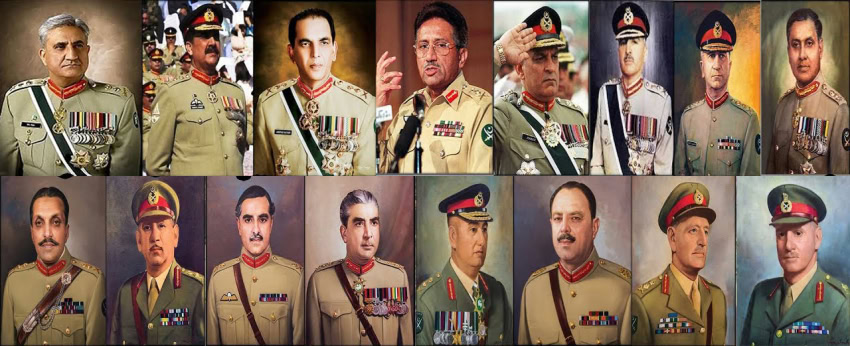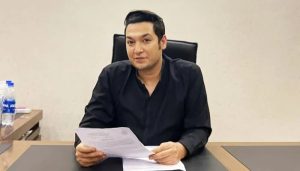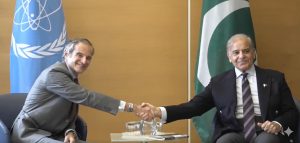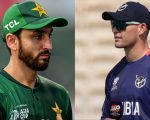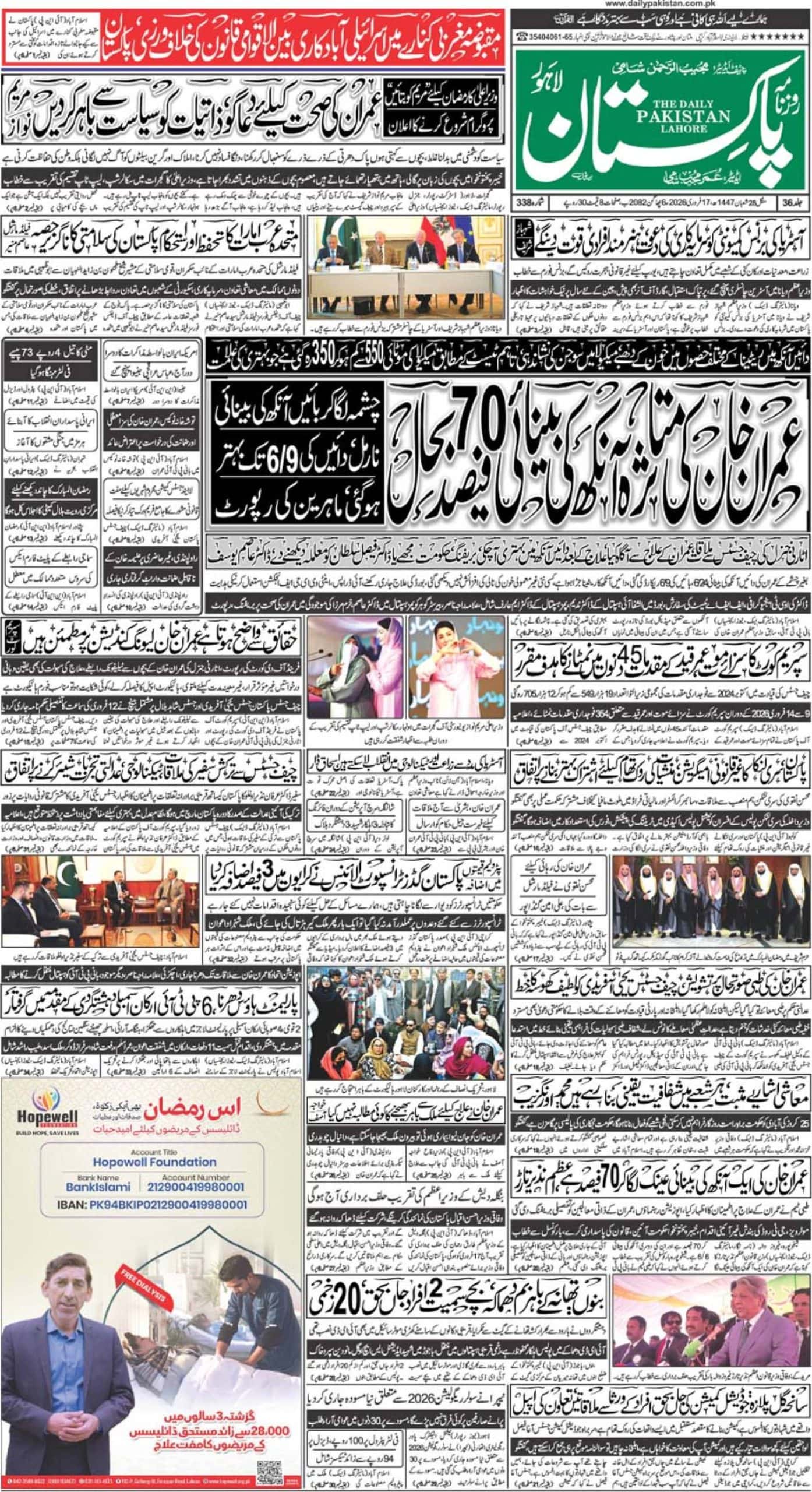The outgoing Chief of Army Staff General Qamar Javed Bajwa is set to pass the baton to General Syed Asim Munir as his tenure comes to an end today.
Here is a brief look at all Army Chiefs in the history of Pakistan.
General Sir Frank Walter Messervy (August 1947 – February 1948)
General Sir Frank Walter Messervy was the first Commander in Chief of the Pakistan Army who took charge on August 15 1947 and served till 10 February 1948.
Historians claimed that country’s founder Muhammad Ali Jinnah ordered his removal after one year.
General Douglas David Gracey (February 1948 – April 1951)
General Sir Douglas David Gracey was commissioned in British Army and served in the First and Second World Wars.
Like General Sir Frank Walter, he also refused Jinnah’s order. He retired prematurely and was Pakistan’s last British Army chief.
Field Marshal Muhammad Ayub Khan (January 1951 – October 1958)
Ayub Khan was commissioned an officer in the Indian army (1928). After partition, he was promoted in Pakistan army from major general (1948) to commander in chief (1951).
He was country’s first native four star General and only (self-appointed) field marshal. In 1958 then President Iskander Mirza revoked constitution and appointed the latter as chief martial law administrator. Later, Ayub Khan had himself declared president, and Mirza was exiled.
General Muhammad Musa (October 1958 – September 1966)
General Musa was commissioned from Indian Military Academy in 1935. He was said to be loyal commander-in-chief to field marshal Ayub Khan. He completed two tenures as army chief through Ayub’s presidency.
He was later appointed governor West Pakistan from 1967 to 1969 before his retirement from service.
General Muhammad Yahya Khan (September 1966 – December 1971)
General Agha Muhammad Yahya Khan was commissioned in British Army in 1939 from Indian Military Academy Dehra Dun and was appointed country’s top commander in 1966.
He succeeded Ayub Khan as president after the latter’s resignation in March 1969.
General Gul Hassan (Commander-in-Chief) (December 1971- March 1972)
General Gul Hassan was picked by then president and populist leader Zulfikar Ali Bhutto. He served as army chief for just over two months before he was deposed by Bhutto at the recommendation of the Hamoodur Rehman Commission.
General Tikka Khan (March 1972 – March 1976)
General Tikka Khan was a graduate of Indian Military Academy from where he was commissioned in 1940. He was appointed by then prime minister Zulfikar Ali Bhutto.
He served one term as country’s first chief of army staff and stepped down after completion of his tenure and was made defence and security advisor by then government.
General Zia-ul-Haq (March 1976 – August 1988)
General Zia-ul-Haq was commissioned in the British Army in 1943. He was named by prime minister Zulfikar Ali Bhutto, and remained army chief for four terms.
The four-star general became the sixth President after military coup and declaration of martial law in 1977. He remained president until his death in 1988.
General Mirza Aslam Beg (August 1988 – August 1991)
General Aslam Beg was commissioned in the Baloch Regiment of Pakistan Army after partition. He succeeded Zia-ul-Haq.
Beg was denied another term as army chief by President Ghulam Ishaq Khan and retired from service.
General Asif Nawaz Janjua (August 1991 – January 1993)
General Asif Nawaz Janjua was a graduate of Royal Military Academy Sandhurst and was commissioned in 1957.
Then President Ghulam Ishaq Khan picked him as country’s top commander. His tenure was cut short after he succumbed to a cardiac arrest.
General Abdul Waheed Kakar (January 1993 – January 1996)
General Abdul Wahid was commissioned in October 1959 in the Frontier Force Regiment through the 20th Long Course at PMA.
Kakar was appointed as Chief of Army Staff in January 1993 and held the office for three years.
General Jehangir Karamat (January 1996 – October 1998)
General Jehangir Karamat was commissioned in 1961 through Long Course at Pakistan Military Academy. He participated in 1965 and 1971 war with India.
Later, he was promoted to four-star general and became Chief of Army Staff, and later became Chairman Joint Chief of Staff in 1997. He also served as the Pakistan envoy to the US until 2006.
General Pervez Musharraf (October 1998 – November 2007)
General Pervez Musharraf was a four-star general of the Pakistan Army who became the tenth president after 1999 military coup.
He was first appointed army chief by the deposed PM Nawaz Sharif, and take power in the 1999 coup. He also served as defence minister.
General Ashfaq Parvez Kayani (November 2007 – November 2013)
General Ashfaq Parvez Kayani was a four-star general who served as the 8th COAS, being appointed in 2007 after Pervez Musharraf stepped down.
He served two terms as top commander after PPP govt approved his extension in 2010.
General Raheel Sharif (November 2013 –November 2016)
General Raheel Sharif was a retired four-star army general who served as the 9th Chief of Army Staff until 2016. After leading Operation Zarb-i-Azb, he quickly developed a strong following. He was the first army chief to retire on time in two decades.
The general was born on June 16, 1956 in Quetta. He assumed the office of Army Chief on November 29, 2013. Gen Sharif was retire in November, 2016.
General Qamar Javed Bajwa (November 2016 – November 2022)
General Qamar Javed Bajwa, a four-star general of the Pakistan Army, is the tenth Chief of Army Staff (COAS). He was appointed to the highest military office by Nawaz Sharif, the then-prime minister of Pakistan, on completion of three-year tenure of his predecessor, General Raheel Sharif.
Gen Bajwa’s three-year tenure as army chief was slated to end on November 29, 2019, but the then Prime Minister Imran Khan granted him an extension in August 2019 and the National Assembly of Pakistan endorsed his extension till November 29, 2022 by passing a bill.
Born in Gakhar Mandi, a small town in the Gujranwala District of Punjab, on November 11, 1960, Gen Bajwa is the youngest son of ex-army man Col (r) Muhammad Iqbal Bajwa. He became an orphan at the age of seven when his father died in Balochistan, and he was brought up by his mother.
Gen Bajwa got his early education at Sir Syed College and Gordon College in Rawalpindi. In 1978, he joined the Pakistan Military Academy in Kakul and graduated in 1980. He is also a graduate of the Canadian Army Command and Staff College (CACSC) and the Naval Postgraduate School in Monterey, California, United States.
In October 1980, Gen Bajwa was commissioned as second lieutenant in the 16th Baloch Regiment at the Sialkot Cantonment. In later years, he served as a staff officer in the X Corps in Rawalpindi. He was promoted to the one-star rank and served as the Chief of Staff at the X Corps.
Gen Bajwa served as a brigade commander under the then Major General Bikram Singh in the UN peacekeeping mission MONUSCO in Congo, commanding the Pakistan Armed Forces-Africa Command.
In May 2009, Gen Bajwa was promoted to the two-star rank. He became a Major General and took over the command of the Force Command Northern Areas (FCNA) as its General Officer Commanding (GOC) in Gilgit-Baltistan.
In 2011, Gen Bajwa was assigned as an instructor at the School of Infantry and Tactics in Quetta. Later, he taught a staff course at the Command and Staff College in Quetta and a course on national security at the National Defence University.
On August 14, 2013, Gen Bajwa was promoted to the three-star rank and posted as field commander of the X Corps in Rawalpindi. He was appointed a Grade-I officer later. A year later, in his capacity as a Lieutenant General, Gen Bajwa was appointed Colonel Commandant of the Baloch Regiment.
On September 22, 2015, Gen Bajwa was appointed the Inspector General of the Training and Evaluation (IGT&E) at the General Headquarters. He served as Principal Staff Officer to the then Chief of Army Staff General Raheel Sharif.
Gen Bajwa carried out counterterrorism operations nationwide in February 2017 and then Khyber-4 in July 2017. He was posted thrice at the X Corps, which happens to be the largest and one of the most important corps of the Pakistan Army.
Gen Bajwa is a recipient of Nishan-e-Imtiaz and Hilal-e-Imtiaz. In 2017, he was awarded the Turkish Legion of Merit for promotion of defence ties between Pakistan and Turkey. In October 2018, he was given the Order of the Military Merit by Jordan’s King Abdullah II.
General Syed Asim Munir
General Syed Asim Munir was promoted to the rank of a four-star general and notified as Pakistan’s next army chief on November 24, 2022. He was picked for the coveted post for being the senior most officer in the Pakistan Army after outgoing Army Chief Qamar Javed Bajwa.
Gen Munir, who was serving as Quartermaster General in the Pakistan Army at the time of his promotion, entered the service via the Officers Training School (OTS) programme in Mangla and was commissioned into the 23rd Battalion of the Frontier Force Regiment.
Gen Munir commanded troops in the Force Command Northern Areas as a brigadier under Gen Bajwa, who was then Commander X Corps. He was appointed DG of the Military Intelligence in early 2017 and then ISI Director General in October 2018.
Eight months later, Gen Munir was posted Gujranwala Corps Commander. He was moved to the GHQ as Quartermaster General two years later.
Gen Munir is the recipient of the Sword of Honour from the 17th course of the Officers Training School in Mangla. Also, he is the recipient of Hilal-i-Imtiaz award.
Despite his retirement due on November 27, Gen Munir was one of the top contenders for the coveted post of Pakistan’s next chief of army staff (COAS) that would fall vacant on Gen Bajwa’s retirement on November 29, 2022.
On November 24, 2022, Prime Minister Shehbaz Sharif picked him as the next army chief and President Arif Alvi approved the summary for his appointment the same day. His retirement was frozen until his appointment as the new army chief of the country.
Gen Munir is the first army chief in the history of Pakistan who is a ‘Hafiz-e-Quran’. He belongs to a well-known religious family of Rawalpindi. He memorised the Holy Quran at a seminary, Darul Tajweedul Quran, located near DAV College Road in the garrison city. He’s a student of the late Islamic preacher Hafiz Khalil Ahmed.
Gen Munir’s father served as a principal of a Tariqabad school in Rawalpindi Cantonment and he too was a ‘Hafiz-e-Quran’.

